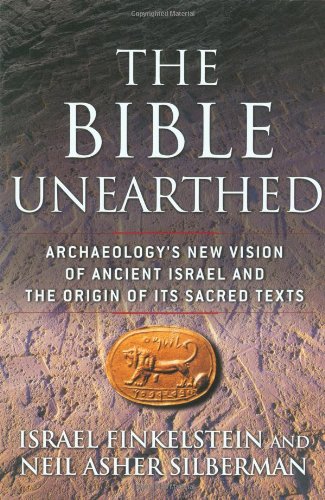The Bible Unearthed: Archaeology’s New Vision of Ancient Israel and the Origin of Its Sacred Texts
In this groundbreaking work that sets apart fact and legend, authors Finkelstein and Silberman use significant archeological discoveries to provide historical information about biblical Israel and its neighbors.In this iconoclastic and provocative work, leading scholars Israel Finkelstein and Neil Asher Silberman draw on recent archaeological research to present a dramatically revised portrait of ancient Israel
In this groundbreaking work that sets apart fact and legend, authors Finkelstein and Silberman use significant archeological discoveries to provide historical information about biblical Israel and its neighbors.
In this iconoclastic and provocative work, leading scholars Israel Finkelstein and Neil Asher Silberman draw on recent archaeological research to present a dramatically revised portrait of ancient Israel and its neighbors. They argue that crucial evidence (or a telling lack of evidence) at digs in Israel, Egypt, Jordan, and Lebanon suggests that many of the most famous stories in the Bible—the wanderings of the patriarchs, the Exodus from Egypt, Joshua’s conquest of Canaan, and David and Solomon’s vast empire—reflect the world of the later authors rather than actual historical facts.
Challenging the fundamentalist readings of the scriptures and marshaling the latest archaeological evidence to support its new vision of ancient Israel, The Bible Unearthed offers a fascinating and controversial perspective on when and why the Bible was written and why it possesses such great spiritual and emotional power today.The Bible Unearthed is a balanced, thoughtful, bold reconsideration of the historical period that produced the Hebrew Bible. The headline news in this book is easy to pick out: there is no evidence for the existence of Abraham, or any of the Patriarchs; ditto for Moses and the Exodus; and the same goes for the whole period of Judges and the united monarchy of David and Solomon. In fact, the authors argue that it is impossible to say much of anything about ancient Israel until the seventh century B.C., around the time of the reign of King Josiah. In that period, “the narrative of the Bible was uniquely suited to further the religious reform and territorial ambitions of Judah.” Yet the authors deny that their arguments should be construed as compromising the Bible’s power. Only in the 18th century–“when the Hebrew Bible began to be dissected and studied in isolation from its powerful function in community life”–did readers begin to view the Bible as a source of empirically verifiable history. For most of its life, the Bible has been what Finkelstein and Silberman reveal it once more to be: an eloquent expression of “the deeply rooted sense of shared origins, experiences, and destiny that every human community needs in order to survive,” written in such a way as to encompass “the men, women, and children, the rich, the poor, and the destitute of an entire community.” –Michael Joseph Gross
Product Features
- Used Book in Good Condition







Comments